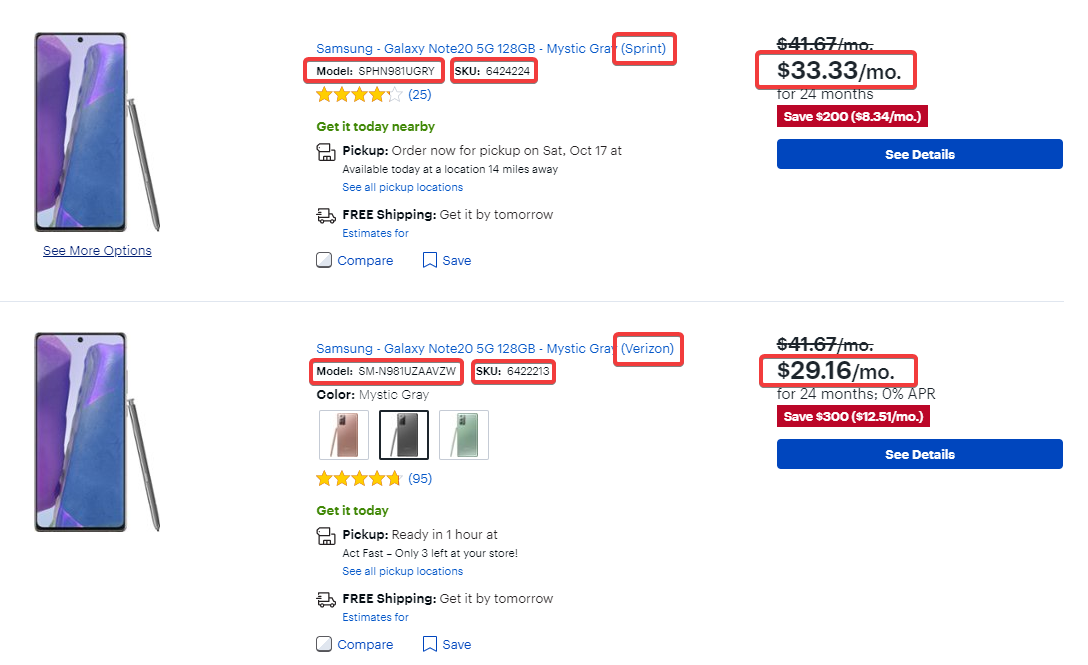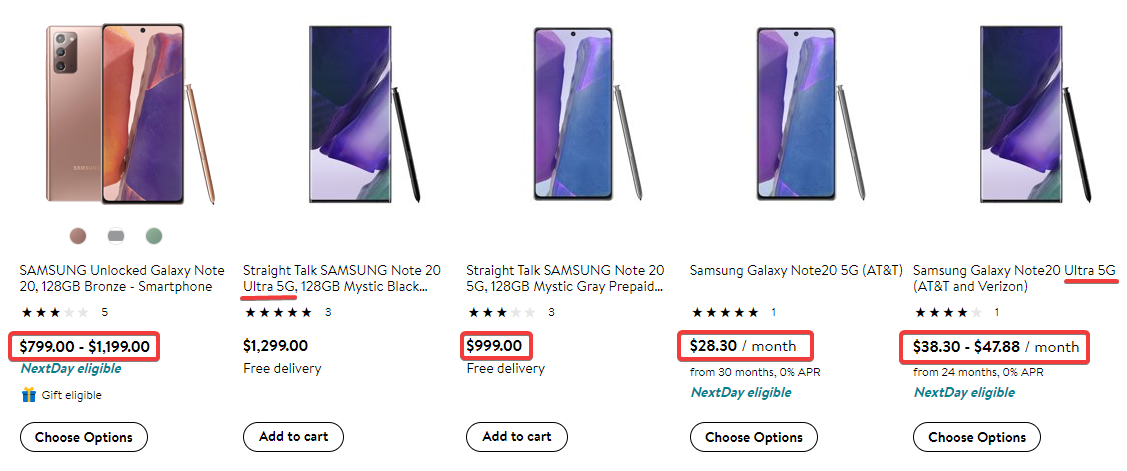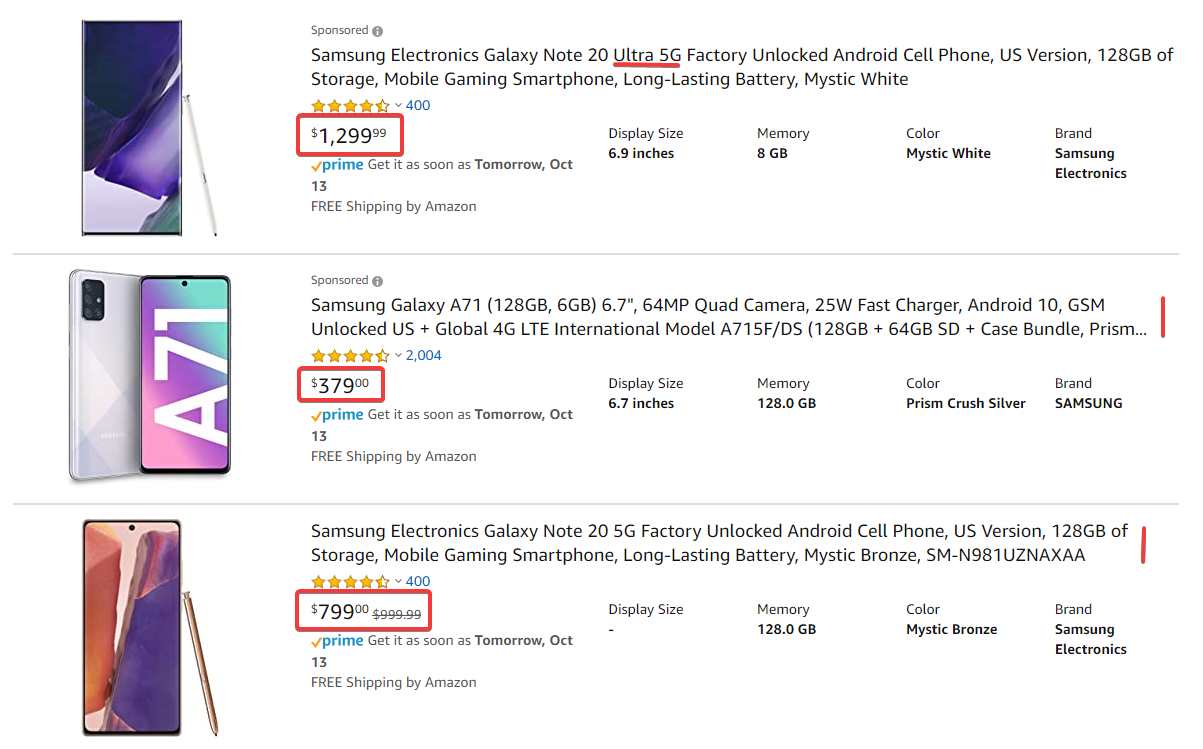Product Matching Challenges
"Apples to Apples" comparison of products across various websites is not as easy as it sounds
Let’s say that Samsung would like to monitor their Smartphones across various popular eCommerce websites such as Amazon.com, Walmart.com, Bestbuy.com etc. and for simplicity sake, let’s focus on just one particular product – the Samsung Galaxy Note 20.
This sounds very simple – just go to each website and search for the term “Samsung Galaxy Note 20”.
The reality is anything but simple as we will illustrate in this article.
Bestbuy.com
Let us search for “Samsung Galaxy Note 20” on BestBuy.com and moving past the carrier selection we see 8 products that match that description according to the bestbuy.com “search engine”.
The results include the Samsung Galaxy Note20 Ultra 5G which is the premium version of the Note 20 which the bestbuy.com “recommendation engine” automatically included with the results in a bid to upsell you this premium product.

The Model numbers for the same phone from each Carrier is different and so are the Bestbuy SKUs for each product. The pricing is also different.
It is already difficult to compare the same phone from just one site from a pricing perspective. It will get even harder as we start to compare this with the other sites. And we are still comparing just one Samsung phone !
Walmart.com
The Walmart.com search and recommendation engines work similar to Best Buy and show the Ultra 5G results with the regular results. Walmart adds the “unlocked” versions of the phones to the carrier phones which adds confusion to any attempted “price comparison”.

Comparing just Bestbuy.com and Walmart.com
Before we check other websites, lets attempt to compare the two websites we have seen so far for the same exact phone by trying to use a computer to perform the comparison.
It is important to highlight the difference between a human comparing products and a computer doing the same thing.
The human has the tremendous benefit of intelligence and in a split second a human can look at two screens and easily compare whether the two products are the same, similar or different.
A computer, on the other hand, can make exact comparison based on letters or numbers. While algorithms exist that compare based on “similarity”, we have seen that they can have varying degree of results based on the context of the products and the “data” available for comparison.
As an exercise, let us take a few examples of products from each site to compare just the “Product Title” to start
Bestbuy.com
- Samsung – Galaxy Note20 5G 128GB – Mystic Gray (Sprint)
Walmart.com
- Straight Talk SAMSUNG Note 20 5G, 128GB Mystic Gray – Prepaid Smartphone
- Straight Talk SAMSUNG Note 20 Ultra 5G, 128GB Mystic Black – Prepaid Smartphone
- Samsung Galaxy Note20 Ultra 5G
- Samsung Galaxy Note20 5G
Even as a smart human, we are certain you cannot match the products based on the Product Title alone. The Bestbuy.com product doesn’t really match any one of the Walmart.com products.
The first result is a “Straight Talk” and Prepaid model which doesn’t compare to the “pay by month” models sold by Walmart.
The 4th result looks likely but it is missing a crucial comparison point – the GB for the phone – we do not know whether it is a 128GB phone or more or less. The color is also missing and if color has an impact on the price, our comparison will be wrong !
Amazon.com
Now let us check Amazon.com. Amazon.com is a massive jungle of products but it is also not a website you can ignore if you are selling anything online
The results for the term “Samsung Galaxy Note20” are 200+ and here are the Top 3 (2 of which are sponsored which increasingly adds to the confusion).

While the “Product Titles” seem more informative, they are filled with a dizzying jumble of keywords which is now a necessity to stand out on the Amazon marketplace. It is pretty evident that any attempts are “product matching or comparison” are going to need a lot more work.